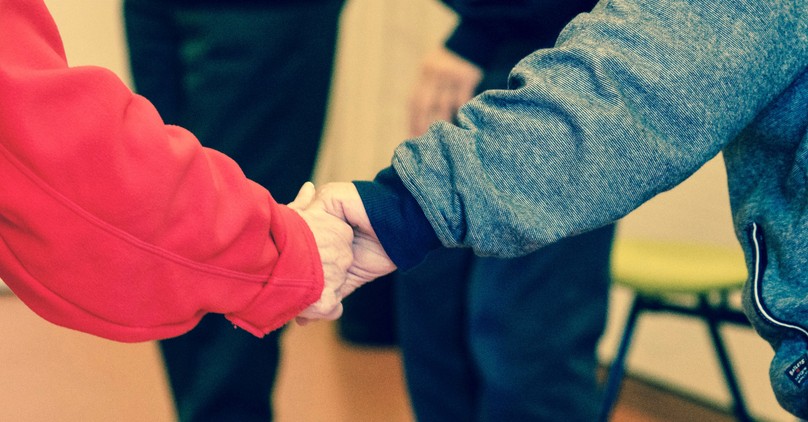
Sitting in a room filled with biblical counselors, we discussed the need for empathy, and I reflected on the ways we grow in empathy, the ways we show it, and how we as leaders in the Christian community can better teach others to extend it. Many confuse empathy with sympathy, and while both are outworkings of compassion, the simplest way to differentiate is that sympathy is feeling for someone, and empathy is feeling with someone. Feeling sorrow or glee for a person is sympathy, but trying to understand the perspective of another by attempting to feel the emotion they feel is how empathy works in our lives. Empathy is one of the ways we attempt to obey the command from Romans 12:15 of rejoicing with those who rejoice and mourning with those who mourn.
The Greater Good Magazine published by UC Berkley reports that “Emotion researchers generally define empathy as the ability to sense other people's emotions, coupled with the ability to imagine what someone else might be thinking or feeling.” Empathy is a succinct word for the idiom of putting yourself in the shoes of another, but practicing this does not always come naturally. In fact, there are ways to offer empathy that might be unexpected. So if you are looking to build your empathetic muscles, these exercises could help you reach your goals:
Photo Credit: ©Pexels/Matthias Zomer
1. Acknowledge What Hinders You
In Hebrews 12:1 believers are instructed to “...lay aside every weight, and sin which clings so closely, and let us run with endurance the race that is set before us,....” Our sin will often keep us from offering empathy, as it makes us overly focused on ourselves. As Augustine put it, sinful man is homo curvatus in se, “man curved in on himself.” But one of the ways God works redemption from sin is that when we have overcome it, we are better prepared to empathize with those who are struggling. The lessons we learn from killing sin help us to encourage others to do the same, without harsh judgment.
In John 8:1-11 we read the story of Jesus and the woman caught in adultery. It is often read as instruction for how to be Christ-like when we respond to those caught in sin, or as a reminder that God sees us and knows us even when sin has reigned in our lives. But I think we see empathy strike down the onslaught of the religious leaders who thrust the woman before Jesus, and there is a valuable lesson to those would-be stone-throwers.
Jesus’ words to those religious leaders were, "'Let him who is without sin among you be the first to throw a stone at her.’...But when they heard it, they went away one by one, beginning with the older ones, and Jesus was left alone with the woman standing before him.” John 8:1-1 When people are struggling, we may desire to eliminate that suffering by offering advice or trying to fix the issue. Those attempts at care can often feel like stones, but when we recall the times we have chosen sin and remember how Jesus met us there, we come to others as those who have received grace. And in those moments, we are ready to offer empathy.

2. Stretch Toward Your Neighbor
Offering empathy requires real interactions with other humans—something that is becoming increasingly easier to avoid as we work from home, have our necessities delivered to our doorstep, and have the option of tuning into Sunday service. If we have the capability to do so, we need to leave our homes and interact with the world, even if the outside world feels intimidating, divisive, even hostile. The tense political climate of our time tempts the believer to live with an “us versus them” mentality when in reality we are all sinners in need of grace. We should see others as neighbors, not as a foe to be defeated or avoided. Perhaps, if we allowed ourselves to physically see others, outside the boundaries of a keyboard or cell phone, we could extend compassion much easier.
We see this vividly in the parable of The Good Samaritan. We recall the story, but we also need to reflect on the question that prompted Jesus to give the explanation. The scriptures say a lawyer was testing Jesus by asking what people need to do to inherit eternal life. The lawyer knew to answer Jesus by saying people should love the Lord with all their heart, soul, strength, and mind, and love their neighbor as themself. Jesus told him to live the answer he knew, but the lawyer in an attempt at self-justification followed up by asking Jesus, "And who is my neighbor?" This question prompted the parable that both teaches and engages the imagination so that we would find ourselves in the story, which brings us to our next discipline:
Photo Credit: ©Getty Images/Daisy
3. Flex Your Imagination with Fiction
Jesus' teachings about kingdom principles in parables show us that God is not only after our obedience but our minds. One of the ways we love God with our minds is with our imaginations. We must take the time to imagine why another person may have acted in a certain way and make room for opinions different than our own while staying faithful to scripture. When reflecting on our current cultural climate, Christian philosopher James K.A Smith writes, “I’ve abandoned all hope that we can think our way out of the mess we’ve made of the world. The pathology that besets us in this cultural moment is a failure of imagination, specifically the failure to imagine the other as neighbor. Empathy is ultimately a feat of the imagination, and arguments are no therapy for a failed, shriveled imagination.” Can you imagine what it would be like to live in this world, at this time, and not have the hope that is found in Christ Jesus? How desperate would you feel? How lost? It is a good exercise even if we are creating fictional scenarios.
Focused and godly imaginations train our minds to walk through the circumstances others live through. Our imaginations should first be informed by scripture so that we can discern what is the truth of God and what are distortions of his intention for humanity. Then we can enter the stories of lives we have not lived, not only by imagining what life is like for others but by reading fiction. Megan Schmidt wrote, “Of course, asserting that reading can fix the world's problems would be naive at best. But it could help make it a more empathetic place. And a growing body of research has found that people who read fiction tend to better understand and share in the feelings of others — even those who are different from themselves.”
Too often we create horror stories about the motivations of others, what they are capable of, and what it might cost us to love one another, but we could instead imagine what the outer and inner world of another might be like. We can meditate on the good qualities of those around us. And once we get our minds in the right place, we can begin to take action.

4. Ask People to Define the Words They Use
Imagination is an important piece of empathy, but it has its limits—remember, we often create fiction in our imagination. If we are trying to understand another correctly we have to hear from them and get the facts. Samuel Silas Curry wrote back in 1891, “It has been well said that we do not see things as they are, but as we are ourselves. Every man looks through the eyes of his prejudices, of his preconceived notions. Hence, it is the most difficult thing in the world to broaden a man so that he will realize truth as other men see it.”
It is a mistake to think that we could understand all the complexities of another completely, and when we are listening to people, we shouldn’t force our perceptions of their experience on them. We have to acknowledge the limitations of our own experiences, and instead, ask others to clarify and define what they are currently experiencing. Our own experiences cloud our interpretation of emotional words like anxious, angry, and joyful, so listen well and ask follow-up questions.
5. Know When to Rest
A byproduct of being empathic is tuning into the emotional state of another human, and with such endeavors, the soul feels the gravity of a fallen world. Researcher Brene Brown reminds us that, “Empathy is a choice, and it’s a vulnerable choice. Because in order to connect with you, I have to connect with something in myself that knows that feeling.”
If we want to be somebody who can offer compassion and empathy throughout the marathon of life, we also need to learn to carry the weight by placing it into the hands of God. Should we try to bear the burden through our own strength, it will crush us. Which in turn will cause us to cease offering our care to others or our hearts will become so hard that our care will not be worth much.
Photo Credit: © Getty Images/skyNext
Remember the Source
Adam Hoffman writes that “Empathy can be painful. Or so suggests a growing body of neuroscientific research. When we witness suffering and distress in others, our natural tendency to empathize can bring us vicarious pain.” This may have to do with what neuroscientists have labeled mirror neurons. Lea Winerman writing for the American Psychological Association defines this reflective neuron, “Mirror neurons are a type of brain cell that respond equally when we perform an action and when we witness someone else perform the same action.”
Many people have labeled the weariness from extending empathy and other like emotions as compassion fatigue. Loving our neighbors well is not for the faint of heart, but it is for the believer. As we love with empathy, we must also guard our hearts and return often to the source of our strength. Prayer, reading the words of God in the Bible, and letting other believers care for us are all necessary elements if we plan on continuing to offer empathy. Our bodies and minds need rest at times, and we can turn to Jesus with all the intricacies of emotional exhaustion. Remember he is the one who tenderly calls to us, “Come to me, all who labor and are heavy laden, and I will give you rest.” Matthew 11:28
Originally published Tuesday, 22 February 2022.





